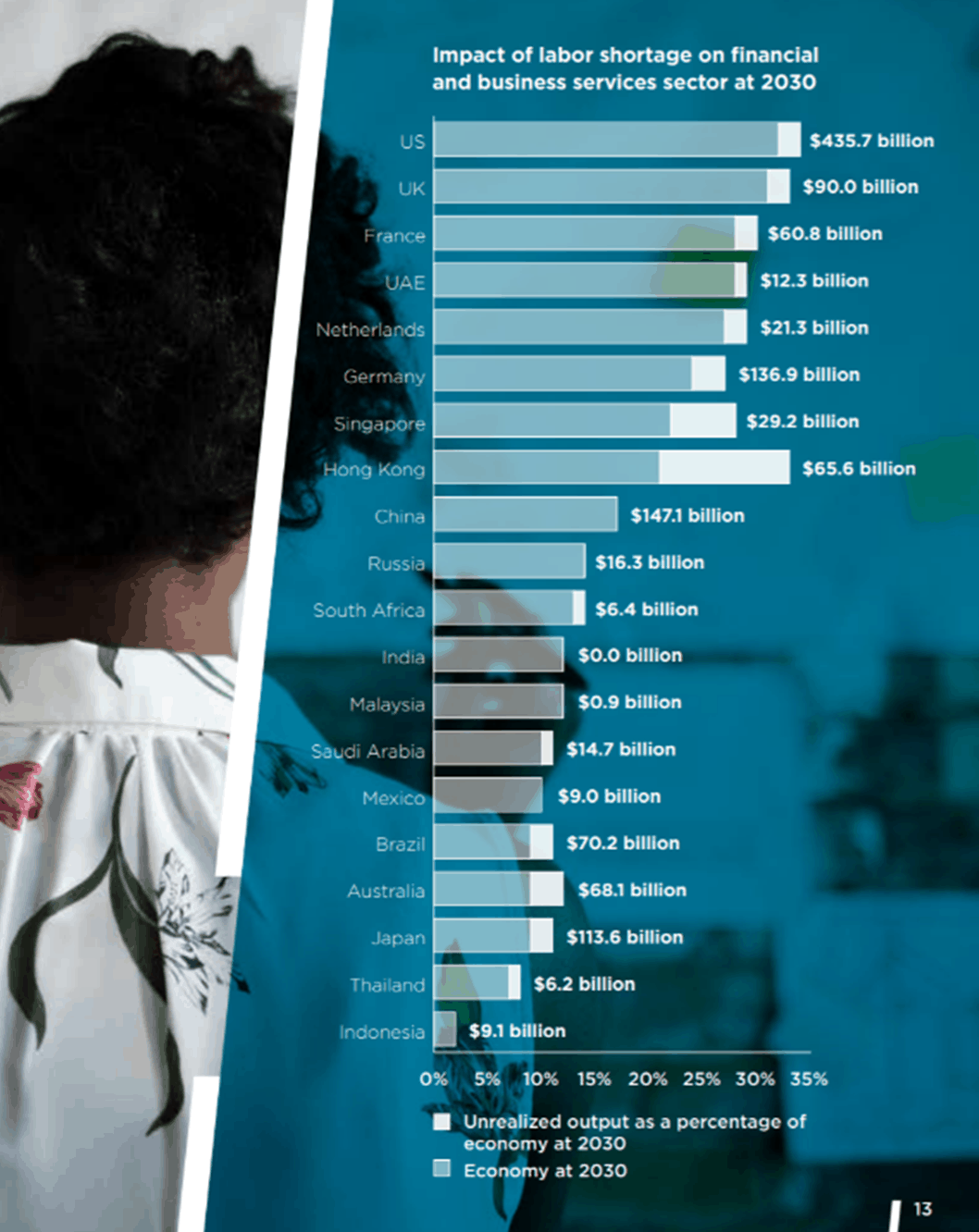
It’s no secret that the global technology industry needs more talent.
According to Korn Ferry Study, “The Global Talent Crunch,” Technology underpins all other sectors of the global economy, but its advancement could be stalled by serious talent problems.”
Dell Technologies Inc. believes the solution to the talent shortage problem is also a solution to another problem that plagues the tech industry: a lack of diversity. On their corporate site, you’ll find Dell’s belief that the talent gap solution lies in closing diversity and inclusion gap. “To serve tomorrow’s customers well, we need more students studying STEM (science, technology, engineering, and math) today – students of all genders and backgrounds. We can’t fill our talent pipeline without closing the diversity gap.”
To accomplish this, among Dell’s goals is to make half of its global workforce female by 2030, …[and] for women to make up 40% of management worldwide.
One of Dell’s strategies in pursuit of these goals is to grow a talent pipeline among current professional women and from as early as middle school. Why is middle school an important age versus high school or earlier years? A 2017 Microsoft survey found that young girls in Europe find STEM interesting at around the age of 11 and then quickly lose interest when they’re 15. If Dell could find a way to retain middle-school girls’ STEM interest, the talent pipeline would grow significantly.

At the other end of that spectrum, more than half of women in tech leave the industry by the mid-point of their career, double the rate of men1. A Capital One Women in Technology report found 23% of women left because of weak management support, 20% for lack of opportunity, and 22% due to lack of work-life balance. For Dell Technologies, the matter of solving the talent pipeline began with the question, how could Dell support and retain talented women? They explored and experimented with an answer at Georgia State University in a student-built application.
Demystifying STEM
Meanwhile, Dr. Simha Magal, Clinical Professor and MSIS Program Director in the CIS department of the Robinson College of Business, Georgia State University, was in the midst of sourcing live app-building projects for his Master of Science in Information Systems (MSIS) graduate students in his new Digital Innovation Experience class. He has found that a project with an engaged client increases his students’ motivation and capability. Magal strives to provide his students with real-world and hands-on experience and engages with industry leaders to make it happen.
Magal noticed that Dell Technologies was hosting a Data Science Webinar on campus featuring Brian K. Reaves, Dell’s Chief Diversity & Inclusion Officer. Magal and Reaves had worked together at SAP on multiple projects where Reaves served as SVP & Head of Diversity and Inclusion.
One of Reaves’ ideas caught Magal’s attention: Could his students build an app that demystifies STEM careers for young girls? Magal saw a match and volunteered his students.
Solving the right problems with the right tools
First, Magal made sure his students were armed with the right tools to solve this problem. Prior to the challenge in the initial eight weeks, the students learned multiple low-code app building platforms. Low-code is the fastest way to build robust apps requiring little to no coding experience. One of the options was Mendix. Students became Mendix-certified via an online learning path. Thus each team member is comparably equipped.
At this point, the class divided into two teams, based on their preferred technology. All members of the Mendix team confidently knew they had the right tool for the job.
Building an app in eight weeks requires significant project management and collaboration. Magal held two workshops. One was on Design Thinking led by Sally Lawler Kennedy, Sr. Director Innovation & Customer Experience at SAP. Marilyn Pratt (former Director Community Advocacy at SAP) and Dr. Maggie Renken, Associate Professor at GSU faculty, provided feedback, mentorship, useful resources, and people to interview.
The second workshop was on Agile development (Scrum Master) led by Anu Smalley of Capala Consulting.
Typically the MSIS program covers the instructional cost of the workshops (fees + travel) and students have to pay for the Scrum Master certification exam and any associated materials. Mendix waives 100% of certification exam fees for students in the Mendix University Program.
The two goals presented at the workshop for the two teams were an app built to create mentorships for adult STEM women and an app to encourage middle-schoolers. The students credit this workshop with giving them both an understanding of the challenge and the empathy to design the solution, especially girls’ needs.
Team work, dream work
Similar to diverse teams in business, the five Mendix team members brought varied levels of previous technical, project management, and customer experience skills to the table: Nikita Agrawal, Abdul Azeez, Uma Kulkarni, Vijay Laxmi, and Vivek Somani. Together they launched the STEM Your Curiosity app.
Originally the plan was to meet in-person weekly for Sprint Reviews as a team and with their Dell clients, Nitcelle Emanuels, Director, Global Diversity & Inclusion Strategic Initiatives, Monica Sanchez, HR Analyst, Shared Services, and Julian Vanderhost, Diversity and Inclusion Tech Innovation Program Manager. Then, COVID hit. In a week, they recovered from the setback relying on remote solutions like Microsoft Teams, Zoom, and the Agile features built into Mendix.
Dell’s dedicated participation in weekly sprint reviews moved from live student app iteration presentations to recordings that Dell would review and provide detailed feedback by noon the following day. Dell’s feedback was invaluable to the success of the app.
The team knew their greatest challenge would be to design for girls. Prompted by Dell, they focused on app styling. The initial version was simply too boring for an early-teen girl accustomed to gamified sites. Two advanced online UX courses2 by Mendix were some of the ways they tackled this and allowed them to unveil a new styling in a weekly Sprint that wowed their Dell clients.
With the styling challenge met, they began to think that two apps for two personas, girls and professional women, as originally assigned to two separate teams, would be valuable together. Inspired, they added a mentoring component to the girls’ app. They quickly agreed to create one powerful app connecting the two personas, yet maintaining a distinct look and feel in separate portals.
When this team decided to add this significant feature to the project scope, Vanderhost warned that they may not finish well or on time. The project was so inspiring to the team they had no doubt they would finish and finish well.
Despite the warnings, the student team reached for more, building a third portal for an app administrator, who could manage accounts and other functions.
Across the three distinct portals they built the following functions:
- Constraining data with XPath (similar to SQL)
- Account creation wizards with timeline
- Anonymous access to the application and then a customized user login and account creation process
Not only were Agrawal, Azeez, Kulkarni, Laxmi, and Somani able to create their application and the three distinct portals on time, impressing Dell, they did it so well, that they won the Spring 2020 Global Mendix Student App contest.
They competed against students across the world. But more importantly, they aspire to have their award-winning work help girls and women all over the world enter and stay in the STEM world.
Learn more about the next Mendix Student App Contest, now hosted by Mendix parent company, Siemens, here.
1https://www.theatlantic.com/magazine/archive/2017/04/why-is-silicon-valley-so-awful-to-women/517788/
2Understand the Value of User Experience: https://gettingstarted.mendixcloud.com/link/path/98/Understand-the-Value-of-User-Experience, and Creating Engaging UX: https://gettingstarted.mendixcloud.com/link/path/28/Creating-Engaging-UX
